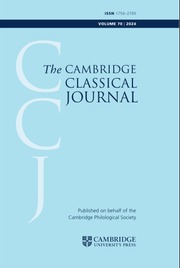Crossref Citations
This article has been cited by the following publications. This list is generated based on data provided by Crossref.
Lambert, Cat
2024.
Forging lesbians: Sappho and The Songs of Bilitis
.
Classical Receptions Journal,
Vol. 16,
Issue. 2,
p.
162.
Mondal, Sarani Ghosal
2025.
Dynamics of Love in Select Poems of Rumi and Sri Aurobindo: An Ontological Study.
Journal of Indian Council of Philosophical Research,
Vol. 42,
Issue. 2,
p.
235.

